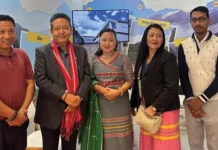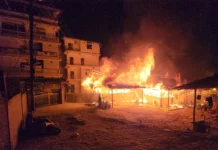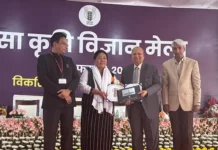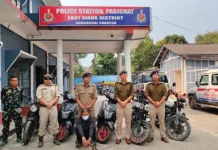HIMSamwaad-2025
ITANAGAR, 23 Jun: Governor KT Parnaik emphasized that the path forward lies in meaningful collaboration between governments, academic institutions, civil society, and most importantly, local communities.
He said this after inaugurating ‘HIMSamwaad-2025’, a three-day national dialogue focused on the Himalayan region’s most pressing social, environmental, and policy issues, in Itanagar on Monday.
He urged all stakeholders to build capacity, remain rooted in indigenous wisdom, and embrace innovation for sustainable development.
Highlighting the role of indigenous knowledge, the governor noted that traditional healing, water conservation, and community practices offer timeless, sustainable solutions. He stated that HIMSamwaad-2025 serves as both an important platform for dialogue and a launch pad for concrete action to build resilient systems, ensure clean water, strengthen public health, and secure a sustainable future for the Himalayan region.
Expressing appreciation for the efforts of Sewa International, RIWATCH, the state government, and environment-conscious NGOs, the governor underlined the critical focus of this year’s samwaad on health and water – two deeply interconnected pillars of mountain life. He emphasized that clean water in the fragile Himalayan ecosystem is not merely about daily needs but is central to health, resilience, and survival. “Climate change, glacial retreat, and unsustainable practices are placing immense stress on traditional water sources, directly affecting lives and livelihoods,” he said.
He said HIMSamwaad offers a timely opportunity to bring together experts, policymakers, and grassroots voices to craft community-led solutions in water conservation, hygiene, and healthcare. This integrated focus aligns with the Sustainable Development Goals-SDG 3 (Good Health and Wellbeing) and SDG 6 (Clean Water and Sanitation) – both essential for long-term wellbeing across the Himalayas.
Citing a major milestone, the governor shared that Arunachal Pradesh has achieved 100% saturation under the Har Ghar Jal initiative, becoming the first Northeastern state and the 10th in India to do so. However, he stressed that “household tap connections are just the beginning – the next step is ensuring access to clean water in every health facility, from rural clinics to major hospitals.”
He praised the state biodiversity action plan as a model that bridges traditional knowledge with scientific planning and community participation.
Speaking warmly of the people of Arunachal, the governor called them the heart and soul of the state. “Their rich diversity, deep-rooted traditions, and close relationship with nature offer powerful lessons in sustainable living,” he said, and emphasized that this cultural strength must guide the state’s development efforts.
The governor also outlined the transformative journey Arunachal is undergoing, with expanding roads, green energy initiatives, and a growing tourism sector – all guided by sustainability. “The Pakke Declaration, the ban on single-use plastics, Sewa Aapke Dwar, and innovations such as the anti-drug app and GIS-based terrain mapping are key initiatives reflecting this balanced approach under the leadership of Chief Minister Pema Khandu,” the governor said.
Addressing the unique challenges in border areas, the governor highlighted that many vibrant villages are located just 20-40 km from international borders. He stressed the need for strategic, inclusive development – one that balances national interest, local participation, and ecological sensitivity. He also called for collaborative cooperation in managing shared water resources through diplomacy, transparency, and mutual respect. A joint initiative with the Army and paramilitary forces is being developed to help secure these regions.
Looking ahead, the governor emphasized the importance of awareness, research, and documentation. He advocated preserving and promoting indigenous knowledge in health, water management, and agriculture. “Oral traditions must be recorded to protect ancestral wisdom for future generations,” he said. In this context, he highlighted the establishment of the Tribal Research Centre at RGU, and another upcoming one at APU Pasighat, as key steps forward.
Sewa International global coordinator Shyam Parande, RM Mission Hospital secretary Swami Vedasarananda, Hyderabad-based Indian Institute of Public Health Acting Vice Chancellor Prof Anil Kaul, Indigenous Faith and Cultural Society of Arunachal Pradesh president Dr Emi Rumi, and RIWATCH Executive Director Vijay Swami, along with delegates from across the country and all Himalayan states, are participating in the programme. (Raj Bhavan)





